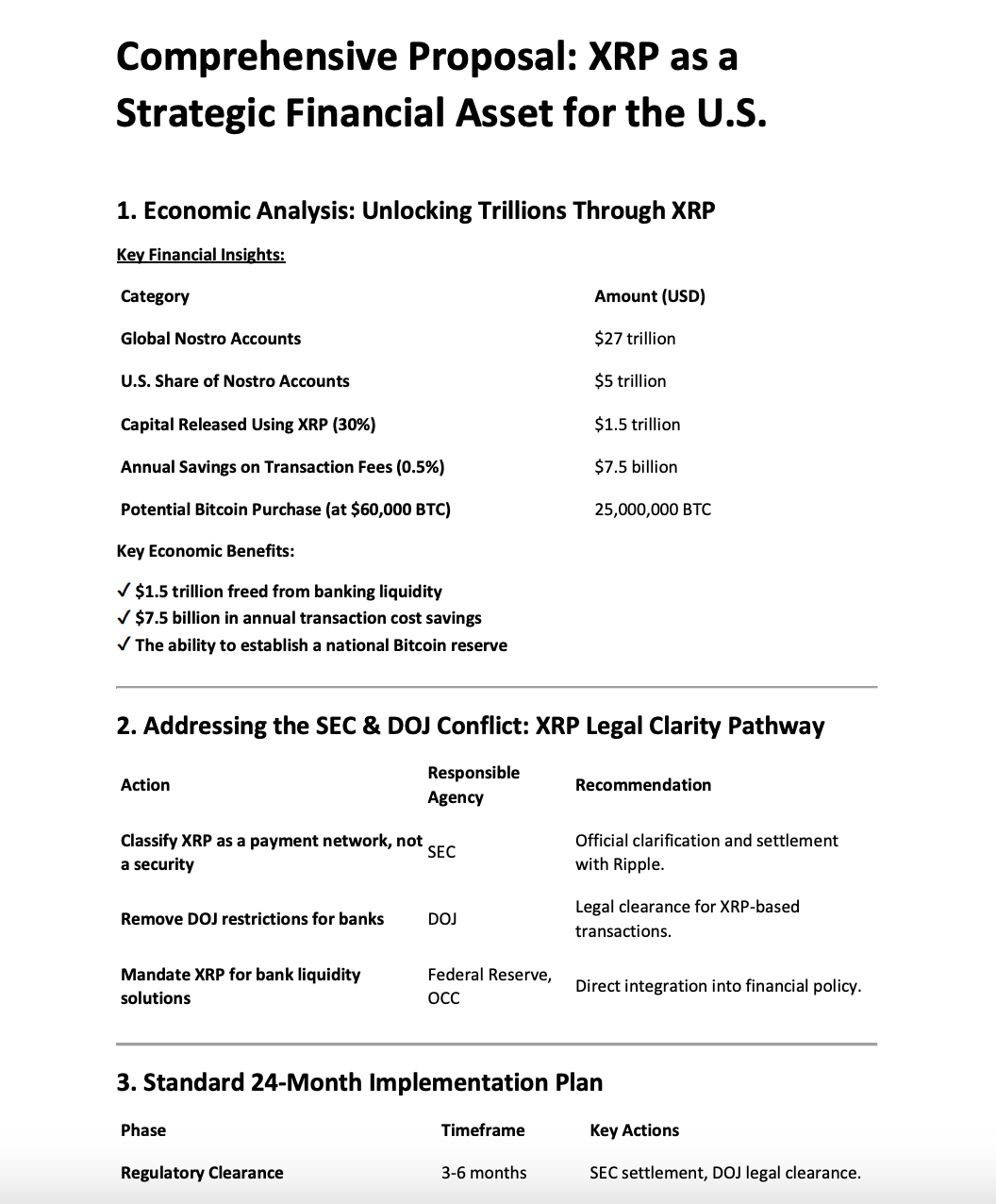SEC Website Document: XRP to Become Official State Currency – What’s Really Going On?
A recent document on the U.S. Securities and Exchange Commission (SEC) website has sparked interest in the crypto community. The proposal suggests that XRP, the digital currency associated with Ripple, should become the official currency of the United States. Could XRP really replace the U.S. Dollar or are they just too ambitious after the recent legal win against the SEC?
What is XRP and Ripple?

XRP is a cryptocurrency created by Ripple Labs, designed primarily for fast and low-cost international payments. Unlike Bitcoin, which focuses on decentralization and security, XRP aims to improve the efficiency of financial transactions, especially in banking and cross-border payments. Ripple, the company behind XRP, provides blockchain-based payment solutions to financial institutions. However, XRP operates on a different consensus mechanism than Bitcoin and Ethereum, which some critics argue makes it more centralized.
Understanding the SEC Proposal Process

The document in question, titled “Comprehensive Proposal: XRP as a Strategic Financial Asset for the U.S.”, was submitted by a private individual—German financial advisor Maximilian Staudinger. It proposes making XRP the primary financial instrument of the U.S. to unlock $1.5 trillion in liquidity and reduce transaction fees by $7.5 billion annually.
However, it’s crucial to understand that anyone can submit proposals to the SEC, and the agency publishes them for public transparency. These documents do not reflect official policy, nor do they mean the SEC endorses the idea. The SEC clarified that this proposal is merely part of the public commenting process, and it has not been reviewed or validated.
Key Points of the Proposal
Staudinger’s proposal includes several major changes to the U.S. financial system:
- Replacing SWIFT with XRP – The plan suggests using XRP instead of traditional banking systems, freeing up $1.5 trillion from U.S. banking reserves.
- Government Integration – It proposes that XRP be used for U.S. government transactions, such as tax payments and Social Security.
- Classification as a Commodity – The proposal calls for an executive order to recognize XRP as a commodity, eliminating legal uncertainties.
- Strategic Crypto Reserves – The U.S. government would use freed capital to buy Bitcoin as a digital reserve, while Solana and Cardano would play supporting roles in government digital services.
Pros and Cons of This Proposal
If the proposal to make XRP the official state currency were to pass, it could bring several benefits. One of the biggest advantages is faster and cheaper transactions. XRP is known for its quick transaction speeds, taking only a few seconds compared to Bitcoin’s 10-minute confirmation time, and it also has significantly lower fees. This could make financial transactions more efficient and cost-effective on a national scale. Another potential benefit is increased liquidity. By replacing traditional banking liquidity solutions, such as SWIFT, with XRP, the U.S. could free up $1.5 trillion in nostro accounts (bank accounts held by a bank in another country), improving capital flow. Additionally, this move would set a major precedent for crypto adoption at the government level. It could demonstrate how digital assets could be integrated into financial systems, leading more lay people to flock to Web3.
However, the proposal also raises serious concerns. The most immediate issue is that it is highly unlikely to pass, as it comes from a private individual rather than a government-backed initiative. While the SEC allows public proposals for transparency, they do not indicate official endorsement or real chances of implementation. Another major concern is XRP’s centralization. Unlike Bitcoin, which is fully decentralized, XRP has been criticized for being largely controlled by Ripple Labs, raising concerns about national security risks if it were adopted at the state level. Network scalability is also a significant issue—despite being around for over a decade, XRP has seen limited adoption by financial institutions, leading to doubts about whether its network could handle an entire country’s financial system. Lastly, there are regulatory challenges. The SEC has previously sued Ripple over XRP’s classification as an unregistered security, and although the case has recently been dropped, changing its legal status to a commodity would require further legal battles and regulatory approval.

Final Thoughts
While the idea of XRP becoming the U.S. state currency seems interesting, it remains purely theoretical. The SEC website serves as a public platform for proposals, but this doesn’t mean they hold any weight. Even if the proposal were seriously considered, issues such as centralization, scalability, and regulatory hurdles make it highly unlikely.
For now, XRP remains a key player in the crypto space, but it is very far from replacing the U.S. dollar!
.svg)


.svg) SHARE TO FACEBOOK
SHARE TO FACEBOOK SHARE TO TWITTER/X
SHARE TO TWITTER/X SHARE TO LINKEDIN
SHARE TO LINKEDIN SEND TO MAIL
SEND TO MAIL


.svg)


.svg)